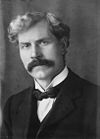British politician (1852–1941)
This article needs additional citations for verification . Please help improve this article by adding citations to reliable sources. Unsourced material may be challenged and removed. Find sources: "Charles Cripps, 1st Baron Parmoor" – news · newspapers · books · scholar · JSTOR (March 2009) ( Learn how and when to remove this message ) |
- ↑ Lancashire at the Opening of the Twentieth Century, W. Burnett Tracy, Lancashire: W. T. Pike, 1903, p. 122
- ↑ "Mr Charles Alfred Cripps, MA, BCL, KC, MP". Lancashire Faces & Places. 1 (3): 39–40. March 1901.
- ↑ "No. 27294". The London Gazette . 15 March 1901. p. 1848.
- 1 2 "leighrayment.com House of Commons: Stamford and Spalding to Stroud and Thornbury". Archived from the original on 10 August 2009. Retrieved 24 July 2009.
{{cite web}}: CS1 maint: unfit URL (link) - ↑ "leighrayment.com House of Commons: Witney to Wythenshawe and Sale East". Archived from the original on 31 December 2010. Retrieved 24 July 2009.
{{cite web}}: CS1 maint: unfit URL (link) - ↑ "No. 28794". The London Gazette . 20 January 1914. p. 495.
- ↑ "No. 28795". The London Gazette . 23 January 1914. p. 587.
- ↑ Privy Council, The Zamora, On Appeal from the High Court, Probate, Divorce, and Admiralty Division. (In Prize.) Powers of King in Council – Royal Prerogative – Extent to which Orders in Council are binding – Inherent Powers of the Court – Preservation of Property in Specie – Neutral Cargo – Contraband – Seizure as Prize – Requisition before Adjudication – Validity – Prize Court Rules at uniset.ca
- ↑ Debrett's Peerage. 1921.
External links
The Lord Parmoor | |
|---|---|
 Parmoor in 1940 | |
| Leader of the House of Lords | |
| In office 7 June 1929 –24 August 1931 |
| Parliament of the United Kingdom | ||
|---|---|---|
| Preceded by | Member of Parliament for Stroud 1895–1900 | Succeeded by |
| Preceded by | Member of Parliament for Stretford 1901–1906 | Succeeded by |
| Preceded by | Member of Parliament for Wycombe 1910–1914 | Succeeded by |
| Political offices | ||
| Preceded by | Lord President of the Council 1924 | Succeeded by |
| Preceded by | Lord President of the Council 1929–1931 | Succeeded by |
| Preceded by | Leader of the House of Lords 1929–1931 | Succeeded by |
| Party political offices | ||
| Preceded by | Leader of the Labour Party in the House of Lords 1928–1931 | Succeeded by |
| Peerage of the United Kingdom | ||
| New creation | Baron Parmoor 1914–1941 | Succeeded by Alfred Cripps |
| House of Commons |
|
|---|---|
| House of Lords |
|
| Prime Minister of the United Kingdom Leader of the House of Commons Foreign Secretary | ||
|---|---|---|
| Lord Chancellor Leader of the House of Lords | ||
| Lord President of the Council | ||
| Chancellor of the Exchequer | ||
| Home Secretary | ||
| First Lord of the Admiralty | ||
| Minister of Agriculture and Fisheries | ||
| Secretary of State for Air | ||
| Secretary of State for the Colonies | ||
| Lord Privy Seal Deputy Leader of the House of Commons | ||
| President of the Board of Education | ||
| Secretary of State for India | ||
| Secretary of State for War | ||
| Minister of Health | ||
| Secretary for Scotland | ||
| Minister of Labour | ||
| Chancellor of the Duchy of Lancaster | ||
| Postmaster General | ||
| President of the Board of Trade | ||
| First Commissioner of Works | ||
| International | |
|---|---|
| National | |
| People | |
